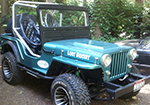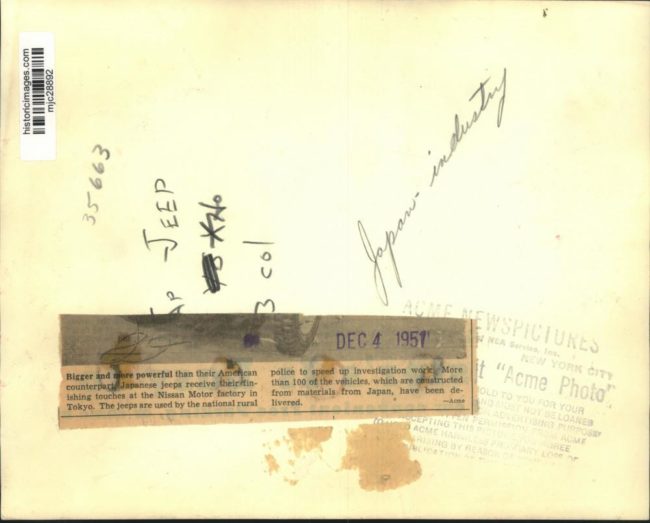This a rare factory photo of early Nissan Patrol 4W60s. It was taken only three months after they began production. The 4W60s were made through 1960.
“1951 Press Photo Japanese workers build jeeps in Tokyo factory, Japan. This is an original press photo. Jeep-Japan – Industry – Bigger and more powerful than their American counterparts, Japanese jeeps receive their finishing touches in the Nissan Motor factory in Tokyo. The jeeps are used by the national rural police to speed up investigation work. More than 100 of the vehicles, which are constructed from materials from Japan, have been delivered. Photo measures 9 x 7.25 inches. Photo is dated 12-04-1951.”



Great photo.. Eerily similar to the Willy’s. WOW. Reverse engineered perhaps?
I’m sure Nissan preferred the phrase “inspired by the original jeep” 🙂
Damn near a direct copy
The Japanese were good at coping cars then. I remember seeing a picture of what looked to be a 2/3 scale of a 1957 Chevrolet car.
The Brits used a Willys MB chassis for the first Land Rover .
Vernon, I appreciate your comment. So, if I understand correctly, you want the photo removed because there are Japanese workers in the photo?
I’m sure there were Japanese people in Hawaii and at Pearl harbor before, during and after WWII. These people were called Americans.
More about the Nissan 4W60
http://www.zonedatsun.fr/modeles/patrol-2/patrol-type-60/
Fred
Wow…you swap the grille and the hood and you’d fool most folks. Unusual ‘flat fender’ that I’ve never knew about. I’m a Philippine born American citizen that proudly owns a ’64 3B and I am ok with the content of this post. Thank you.
My dad was at Pearl Harbor when it was bombed and he was okay with owning Japanese cars in the mid 1970’s and in 1980 help build our auto repair business based on Japanese vehicles. Not to mention some of the “Made in Japan” toys I had when I was a child.
I take pride we Ameicans rebuilt the axis economies, that did change warfare. We should honor our vets and war dead but in doing so Amecans are a different breed, we befriend former enemies. I have a Japanese friend who is very much a jeep guy, he has a Mitsubishi CJ3B. – I’ll ask him if he has seen one of these early Patrols
Vernon, I’m curious where you purchased your 100% American made computer filled with 100% American made parts? What brand is it?
Thanks, Paul
Well from Vernon’s perspective, I did not hear much stories about first-hand accounts of the realities of war in the Pacific theater, let alone The Philippines, where I grew up. All I knew growing up was that we despised the Japanese mainly due to WWII that they were completely fanatical of war strategies and ruthless of the locals and prisoners. This did not prevent us from using what technology came from there, even the Japanese built Jeepneys, as now regarded as a national treasure. I vaguely remember stories but maybe due to my age (36) and the younger generation may ‘un’fortunately? not hear stories of first hand accounts but rather just read how brutal the Japanese were in their obsolete libraries or by talking to Siri. I believe at this point in time, those vague stories were not powerful enough to have me even start to think to factor in how cruel the Japanese were 70+ years ago on trying why NOT to purchase Japanese products like Toyota’s or Honda’s even though the US consensus as a whole believes that Japanese vehicles are of far if not better built for the price than U.S. Ford’s and Chevy’s… Can you imagine denying your kids/grandkids nintendo-sega-atari-PlayStation and have to wait all the way to Xbox just because its finally US made not Japan. Not having to listen to Beethoven or refuse to drink lager beers because that’s from Hitler’s Germany or denying yourself spaghetti and lasagna because Italy was our foe. Where do you then draw the line if its even worth drawing? I apologize if my comments went off topic from this post.
Vernon,
Condemning the entire Japanese race for the Pacific War is flat out wrong. The US military leaders of WWII who fought the Japanese, who sent men to die in the Pacific, were bigger people, realizing that working with, aiding, and befriending the Japanese was more important than beating them down (a lesson partially learned from the Germany and the end of WWI). Turning enemies to allies has proving a successful foreign policy strategy. Japan, the Japanese, are our allies.
The Japanese soldiers who fought your grandfather are dead. Do not condemn their innocent progeny for the acts of their forefathers. For if you do, then the same logic applies to Americans, for that means you and I are responsible for torture inflicted on the Philippine citizens when American soldiers first landed there; that means we are all responsible for the decimation of Indian tribes; that we are all responsible for slavery, the Civil War deaths, and more. By your logic, every citizen of the world has blood on their hands.
And, for the record, I have studied the Pacific war in depth for an upcoming book, so I am fully aware of what the Japanese soldiers did to Americans, Chinese, and plenty of other cultures throughout southeast Asia. I can cite the statistics of how many American POWs died at the hands of the Japanese vs. the Germans. I understand that the Japanese would have paid the US POWs who survived forced labor in Japanese companies during WWII their back wages if it weren’t for our own State department. I feel confident that, having analyzed the reasons behind dropping the atomic bombs, that we would probably have to do the same horrific thing again.
If you think turning our backs on the Japanese, kicking them to the curb, then having them ally them selves with Russia or China is good foreign policy, then you’d better study your history. And, as Paul points out, if you own any technology, you likely have Japanese parts, design, or manufacturing elements in them. And, even better, there are “Japanese” vehicles that are made up more of American-made parts than “American” cars. Twenty years ago I studied tractors: At that time, John Deere tractors were made up of more foreign parts than “Japanese” Kubota tractors. So, which was more American?
Yeah so Nissan 4W61 and 4W65 (wagon) looks to have similar grille styling from 50s Willys pick up and wagons.
Thank you ever so for you post.Much thanks again.